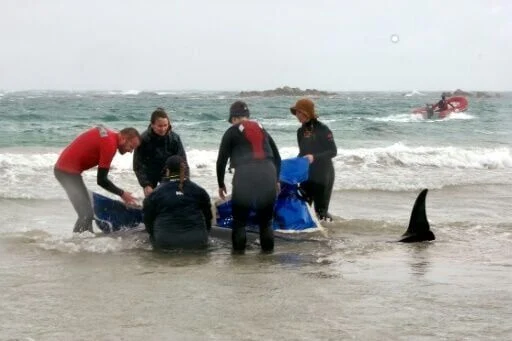Wildlife rangers in Tasmania will begin euthanising 90 dolphins on Wednesday after their attempts to refloat the creatures on a remote beach were unsuccessful.
The pod of 157 dolphins, thought to be false killer whales, was discovered stranded on a beach near the Arthur River inlet in southern Australia on Tuesday evening. However, by Wednesday afternoon, only 90 dolphins had survived, and their condition continued to worsen under the intense heat and strong winds.
Shelley Graham, incident controller with Tasmania’s environment department, confirmed the difficult decision to euthanise the animals. “Following expert veterinary assessment, we have made the decision to euthanise the animals,” Graham said. “That’s likely to be the course of action for all 90.”
Efforts to refloat the dolphins, which can weigh up to a tonne each, were unsuccessful, with biologist Kris Carlyon explaining that the location was “extremely remote” and access to the site was difficult. “We’ve given it a good crack this morning, but we are running out of options for a successful refloat,” Carlyon said.

The dolphins, which had washed ashore during high tides, were members of the poorly understood deep-sea species known as false killer whales, named for their orca-like skulls.
Mass strandings of false killer whales on Australian beaches are not unusual, but it is the first time in 50 years that such an event has occurred in this part of Tasmania. The exact cause of the stranding remains unclear, though scientists believe that strong social bonds within the pod could cause one disoriented individual to lead others ashore.
Marine scientist Vanessa Pirotta noted the difficulty of studying strandings: “We don’t yet understand why whales and dolphins strand. Tasmania has proven to be a hotspot location for seeing mass strandings like this.”
False killer whales, which can grow up to 6 meters (20 feet) long, are listed as near threatened by the Australian government due to their uncertain population status and vulnerability to strandings.


